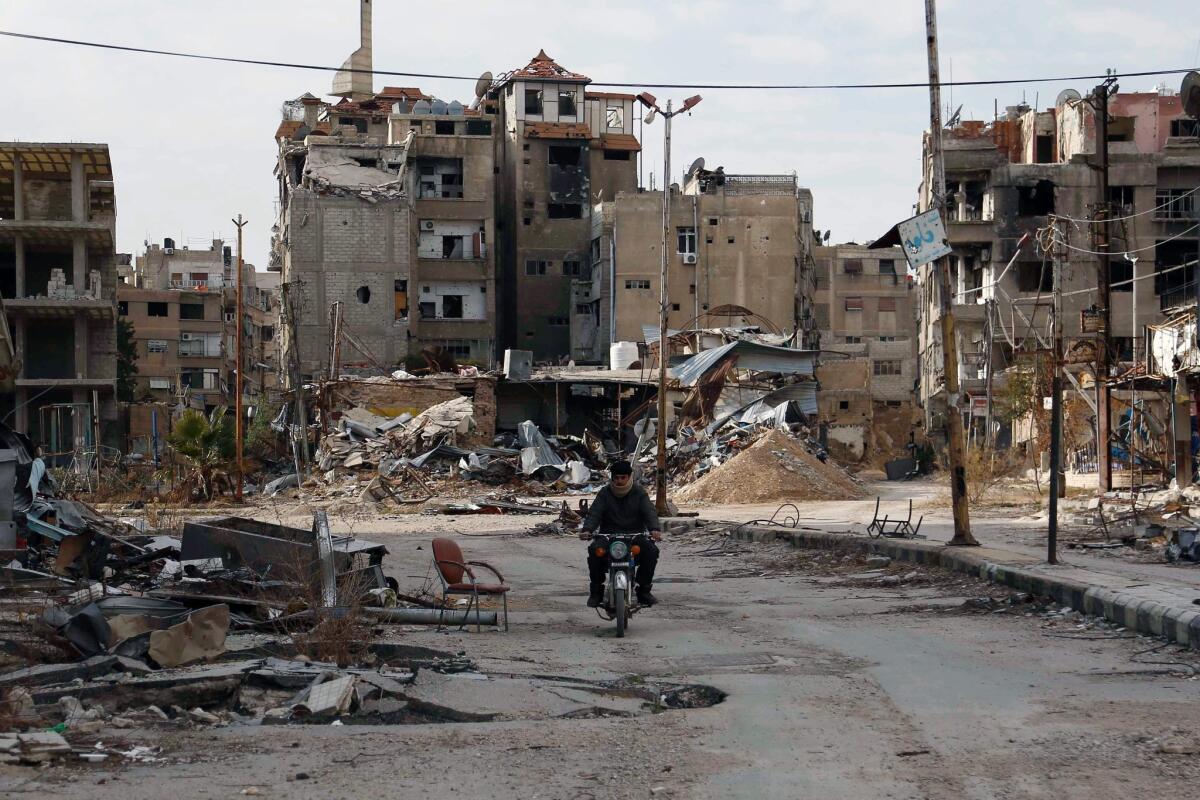Opinion: Let’s hope the Syrian cease-fire will help end the slaughter of civilians

A man drives his motorbike past damaged buildings in Harasta, east of the Syrian capital Damascus. The war, about to enter its sixth year, has been catastrophic for millions of civilians.
- Share via
As Syria heads into its sixth year of civil war, some of the principal participants and their patrons – the U.S. and Russia – have announced another “cessation of hostilities” beginning this weekend. The upside: If it works this time, crucial humanitarian aid might finally reach some of the hundreds of thousands of civilians caught in the crossfire of this chaotic war. But there’s more room for pessimism than optimism.
Notably, Syria retains the right to retaliate against terrorist attacks, and the cease-fire doesn’t include Islamic State. With all the small groups of overlapping actors in the war, provocations are likely, as are retaliations. So maybe they should refer to this as a “lightening of hostilities.”
It’s a mess no matter how you look at it, with the U.S. now effectively fighting a proxy war against itself, and simultaneously supporting Turkey and a group the Turks are attacking. While diplomacy remains the best chance for an end to this, finding common ground has proven to be impossible. Though Syria, with Russian air support, has begun retaking ground, no military victory seems likely, either.
“Growing in complexity, the Syrian conflict has involved an increasing number of belligerents on a multitude of interconnected front lines,” a recent United Nations Human Rights Council report said. “While no party seems able to achieve ‘victory,’ all appear to have sufficient capacity to sustain operations for the foreseeable future, perpetuating death and destruction along the way.”
That intractability has worn out the rest of the world, despite the incredible humanitarian crisis the war has spawned. More than a million people risking their lives at sea in hopes of finding a life in Europe, with thousands drowning en route. Millions of displaced people sheltering in ruins in Syria and Iraq, in camps in Turkey, Jordan and elsewhere, or squatting in villages and small cities where they can find space and sustenance.
And then there are the people who lack the means and wherewithal to leave. The Human Rights Council report details flagrant human rights violations as near-daily occurrences. The “horrors are pervasive and ever present. The lives of Syrian men, women and children have been ravaged as they suffer the destruction of their country and the devastation of the Syrian mosaic. As the conflict has intensified, civilians remain the primary victims, and are often the object of deliberate attacks by the warring parties.”
Specifically, the council reported that most of Syria’s casualties are civilians targeted by “belligerents,” as it calls them, from all sides, though primarily driven by the pro-government forces. The attacks include barrel bombs dropped on residential neighborhoods, markets and other civilian targets. But forces backed by the U.S. – as well as U.S. airstrikes – could be implicated in civilian casualties in areas controlled by the Islamic State, where the council noted that verifying information is near impossible.
So what is life like for the remaining Syrian civilians? Access to electricity and reliable potable water is limited. Medical care is limited. Access to food ranges from limited to nonexistent. Countless buildings and communities have been shelled into uninhabitable rubble. Kidnappings, torture and executions are commonplace (particularly in Islamic State--controlled areas), and the main method of warfare is the siege, trapping defenseless civilians in untenable situations.
As painful as the report is to read, the conclusion is even worse. The Independent International Commission of Inquiry on the Syrian Arab Republic, charged by the council to conduct regular reviews of conditions, seems at the end to throw its hands up in despair - though carefully couched in terms of bureaucratic diplomacy.
“As its reports have remained current to the reporting cycle during which they were written, the Commission began a practice of reiterating the recommendations made in its previous reports as a means to draw continued attention to a large number of recommendations made at an earlier time in the armed conflict that remain both salient and unimplemented. Once again, the Commission reiterates the recommendations made in its previous reports addressed to all parties to the conflict.”
The recommendations? In essence, stop slaughtering civilians. With any luck, the pending “cessation of hostilities” might actually reduce the unconscionable carnage. But as war seems to be the state of nature across that chaotic theater, a true end to the nightmarish crimes against humanity still seems far off.
Follow Scott Martelle on Twitter @smartelle.
More to Read
A cure for the common opinion
Get thought-provoking perspectives with our weekly newsletter.
You may occasionally receive promotional content from the Los Angeles Times.










